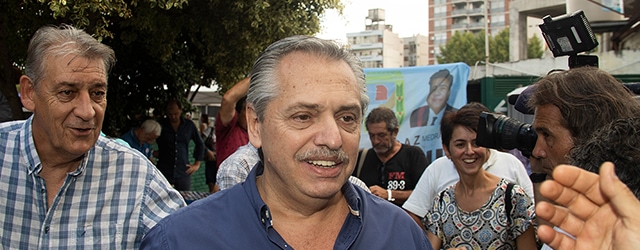The frontrunner in Argentina's presidential election is going to inherit a mess.

If Alberto Fernandez, the man expected to win Argentina’s presidential elections on October 27, makes good on his campaign rhetoric to shun the International Monetary Fund’s efforts to shore up the country’s debt crisis, a big haircut on its $100 billion-plus debt restructuring would seem highly likely.
“If on Day One he says, ‘Let’s go to Washington!’ that might suggest cooperation. But if he is more Cristina-like [referring to running mate and former nationalist leader Cristina Fernandez de Kirchner] and says the Fund doesn’t understand Argentina and delays a restructuring, they would be left to their own devices,” says Stuart Culverhouse, head of Fixed Income Research at Tellimer. “We could see a big haircut and a big creditor battle.”
Such an event—which some say could exceed the 75% haircut Argentina imposed on foreign bonds in 2005—became more likely after the IMF delayed its disbursement of $5.4 billion, the latest tranche of its $57 billion bailout package. Without these funds, Argentina’s debt malaise is only expected worsen, observers say. So far, Buenos Aires has asked for maturity extensions but no cuts on nominal values.
While the Fund could decide to issue the loan following the coming elections, Fernandez’s mixed policy messages are undermining that possibility. “A lot of what he says is contradictory and incoherent,” Culverhouse says. “On the one hand, he says Argentina will continue to meet the IMF’s obligations, but on the other, that its program is illegal.”
Even if the new administration—whose chances of winning rose after President Mauricio Macri lost a primary vote on August 11—is able to strike a win-win deal with the IMF, a milder haircut could still happen, Culverhouse says. He notes, however, that so-called collective action clauses, or CACs, now give investors greater leverage to lessen a default’s impact. Still, one bond investor notes that even with the CACs, “if they do a haircut, it’s a haircut, and it’s going to hurt everyone,” adding that Argentina would be wise to avoid a nominal cut at all costs.
With much of Argentina’s bond curve trading at 40 cents on the dollar, analysts estimate that a 30% to 65% haircut is priced in.



